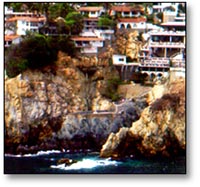
ACAPULCO
An Introduction
Long
before Acapulco became Mexico's most popular tourist destination, it was
already the most important port along Mexico's Pacific
Coast. Because of the Spanish government's rigid trading policy, Acapulco
was the only port where merchants were allowed receive Asian goods. If
you were a merchant in Mexico City, once a year church bells would start
ringing and you would immediately head for the coast to meet the galleon
from Manilla. The galleon would drop off its load of silk, porcelain, and
spices, then take on tons of silver and head back across the Pacific.
Pacific
Coast. Because of the Spanish government's rigid trading policy, Acapulco
was the only port where merchants were allowed receive Asian goods. If
you were a merchant in Mexico City, once a year church bells would start
ringing and you would immediately head for the coast to meet the galleon
from Manilla. The galleon would drop off its load of silk, porcelain, and
spices, then take on tons of silver and head back across the Pacific.
Unsurprisingly, pirates considered Acapulco's galleon a sure thing. By 1616,
so many galleons and mule trains had fallen prey to such infamous characters
as Sir Francis Drake and Henry Morgan that the government decided to build a
fort. It was called Fort San Diego, and today it is one of Acapulco's best historical
attractions.
It wasn't until the 1920s that Acapulco began its rise to tourism capital. It
only takes one movie star, member of a royal family, famous author or politician
to turn a sleepy city into famous escape, and in 1920 the famous person was Edward
VIII, Prince of Wales. Thirty years later, after the Texas entrepeneur Albert
B. Pullen began developing the city for serious tourism, Acapulco was attracting
the elite of both Mexico and America. Though today the city is far more geared
to families, it is still a prime choice for the jet set.
Acapulco is situated on wide bay lined with hotels and beaches, not unlike Hawaii's
Waikiki. The excellent beaches hardly need explaining: they and the world-famous
cliff divers at La Quebrada are the principal reasons why people come. The beaches,
combined with the markets, restaurants, and nightlife along Costera Miguel Aleman
- the main strip - combine to make Acapulco what many people consider the definition
of vacation.
Copyright (c) 1998-2008 interKnowledge Corp. All rights reserved.
